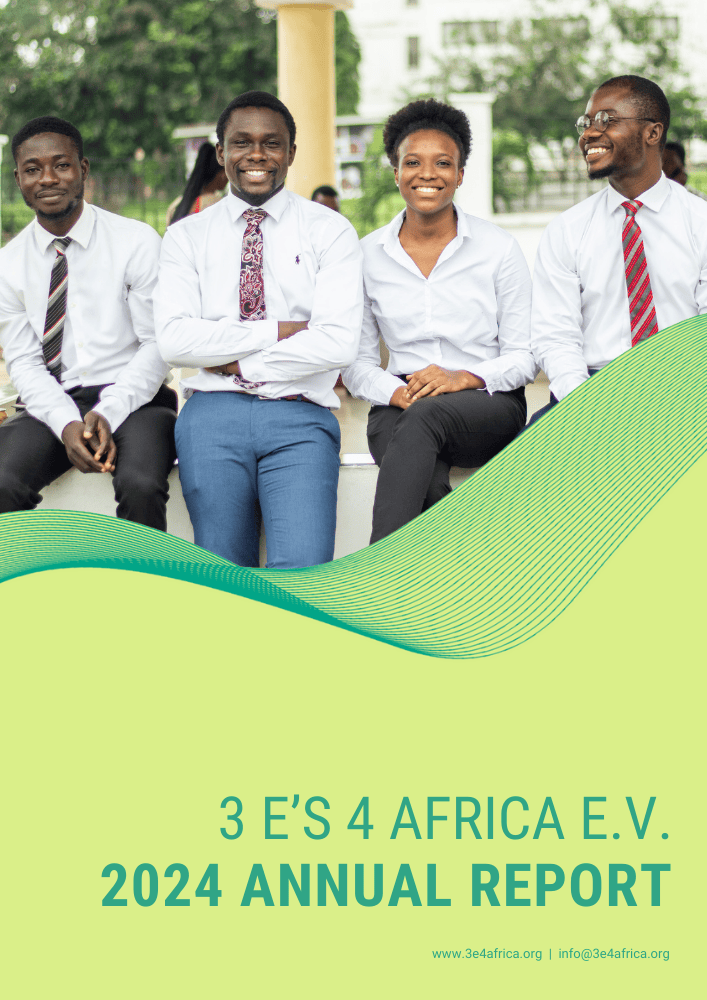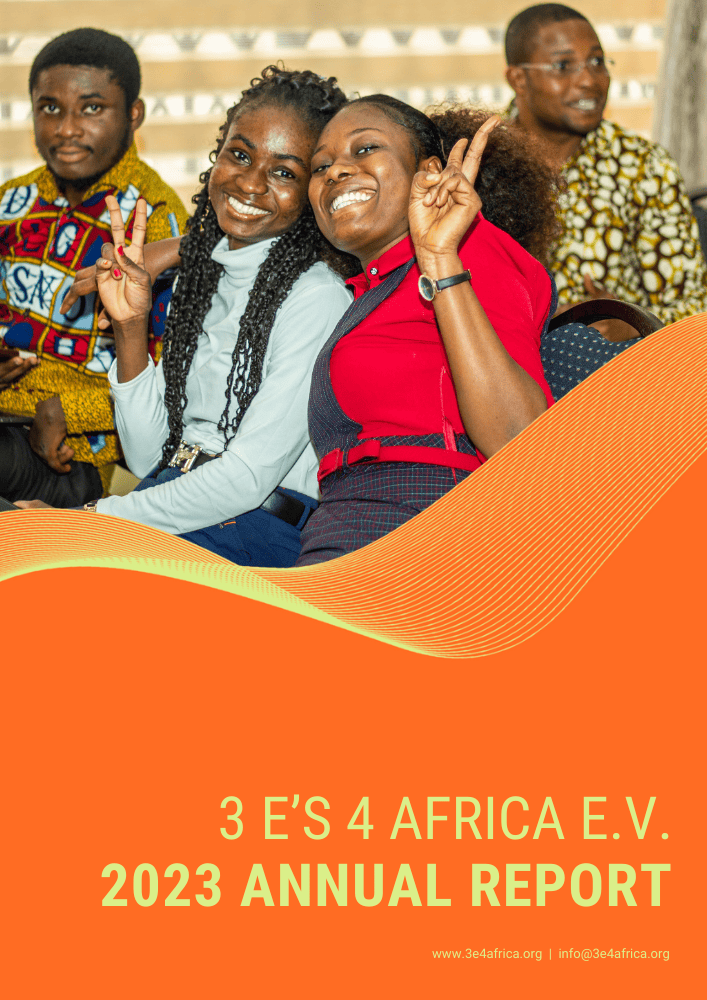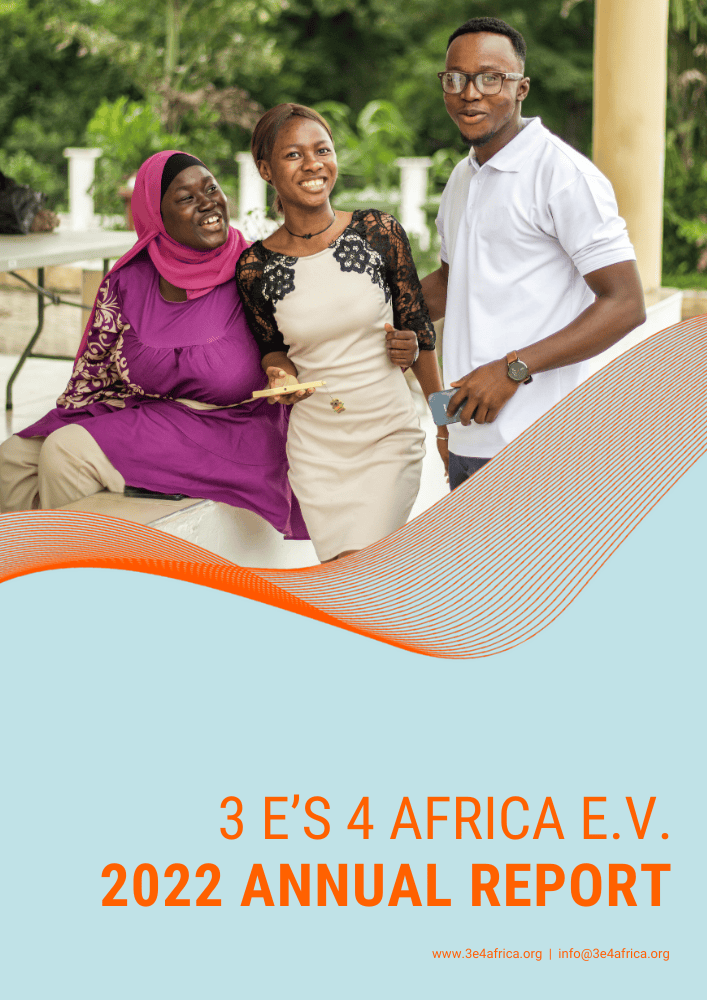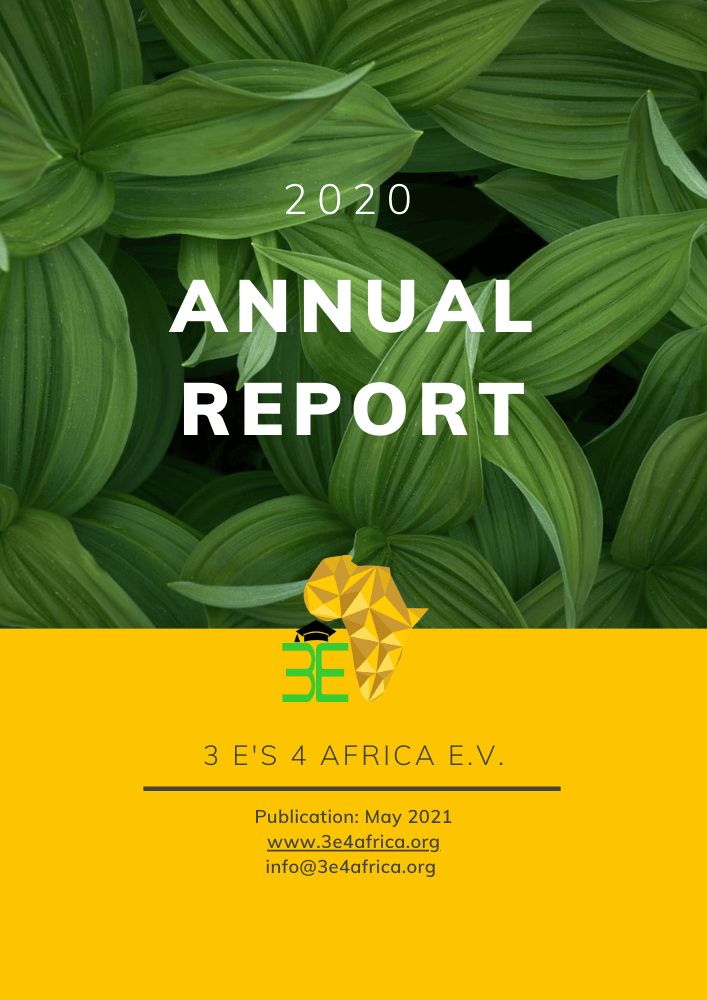About Us
3 E’s 4 Africa e.V. is a non-profit association and carries out activities and projects to promote |#education| of African students and researchers. Furthermore, the association is dedicated to the |#empowerment| of the above-mentioned African students and researchers at universities in Africa and to the Ecofriendliness |#ecofriendliness| of the funded research projects. The name 3 E’s 4 Africa originates from these three pillars. The original idea, and thus the foundation for establishing the association, goes back to a Cameroonian student.
- 3E4A
- Board
- Projects
- Fundraising
- PR
- Finance & IT

Anahid
Ndouop

Leticia
dos Santos Nsadi

Matilda
Poretti

Stephane
Douonmong
Annual Reports
Our history
Dashboard
Insights in our financials and amount of memberships as an interactive dashboard.
Code of Values
We all share common values that form the basis of the work of 3 E’s 4 Africa e.V. These values represent the heart of our association culture and are our roadmap. They describe what we stand for and what we do.
Our activities aim to bring about a long-term and self-determined change in Africa. The foundation of our association was established by a young Cameroonian. Thus, the association is strongly connected to Africa from the ground up. We want to remain true to this connection. Our commitment to the empowerment and support of young Africans should remain our focus, because they are the bearers of hope on the continent and can shape their own future.
Without sustainability no real change, and therefore no impact, can be achieved. We are convinced that nothing is more sustainable than education and environmentally conscious action. That is why the association ties its core activities to education in Africa. Furthermore, the association wants to dedicate itself to the topic of environmental sustainability and at the same time ensure that this topic is addressed in Africa in the long term and established as an innovative field of research. In addition, the association wants to make a direct contribution to the sustainability goals (SDGs) 4 (Qualitative Education), 7 (Affordable and Clean Energy), 12 (Sustainable Production and Consumption) and 13 (Measures for Climate Protection) set by the UN with its work and the results of the funded projects.
With our research projects we want to promote African approaches to African challenges. In this way, we want to find a definition for innovation developed by Africans themselves and promote it together with local pioneers. To achieve this, we also place the highest demands on ourselves in terms of an ambitious working method and objectives, which are anchored in the association. In this way we guarantee that internal processes and the implementation of the projects are constantly optimised on a technical, economic and social level and remain at a high, modern standard.
We attach great importance to a respectful treatment of our members, local and international partners. Successful cooperation requires committed and goal-oriented action by equal partners. The active members of the association 3 E’s 4 Africa are an essential part of the cooperation and are accordingly valued and actively supported. It is a basic principle of the association to recognise everyone who actively supports or wants to support the association. Within the association we work responsibly, prudently and collegially. We actively speak out against discrimination, sexism, racism and any other form of exclusion or exploitation of unequal power structures. Regardless of gender, origin, culture, skin colour and religion, we welcome everyone who shares our values with intrinsic motivation and wishes to make an active contribution to our vision.
Constitution
This is the complete constitution of 3 E’s 4 Africa e.V., adopted at the general assembly on June 29, 2020 in Aachen.
- § 1 Name, seat, financial year
- § 2 Purpose and tasks of the association
- § 3 Tax concession
- § 4 Membership
- § 5 Contributions or fees
- § 6 Organs of the association
- § 7 The general assembly
- § 8 The Board of directors
- § 9 Amendments to the consitution and dissolution
- § 10 Data protection
The association is called "3 E‘s 4 Africa e.V.".
It has its seat in Aretzstraße 52, 52070 Aachen, Germany and is entered in the register of associations under the abbreviation VR 6057 at the local court Aachen.
The financial year of the association is the calendar year.
- The purpose of the association is to increase the degree of autonomy of African students and doctoral candidates at universities in Africa. The purpose of the association is mainly fulfilled by promoting the education of students and doctoral candidates in the form of local research projects with a sustainable and environmentally friendly focus.
- Local research projects with a sustainable and environmentally friendly focus are to be understood as projects at African universities that aim to research local and sustainable approaches to solving the issues of energy system transformation, climate change mitigation and adaptation in Africa. In the following, these will be referred to as projects.
- In order to achieve the purpose of the constitution, the association is particularly active in the following areas:
- Conceptual and technical development of possible project ideas and appraisal of received project ideas.
- Ideal and conceptual support and monitoring of projects.
- Purpose-orientated financial contributions for the implementation of projects.
- Establishment and promotion of a network for cooperation between the participating universities.
- Implementation and support of local educational measures, such as workshops, in cooperation with local actors in the context of the local research projects defined under 2. with a sustainable and environmentally friendly focus.
- Awareness raising and public relations work.
The association exclusively and directly pursues charitable purposes in the sense of the section " tax-deductible purposes" of the German tax code. The association is non-profit-oriented; it does not primarily pursue its own economic purposes.
Funds of the association may only be used for the purposes outlined in the constitution. The members do not receive any benefits from the association's funds in their capacity as members. They have no claims to the association's assets when they leave the association.
No person may be favoured by expenses that are not in line with the purposes of the association or by disproportionately high remuneration.
The association consists of:
- Active members (No. 1)
- Honorary members (No. 2)
- Sponsors (No. 3).
- Natural persons can become members and sponsors. Legal entities may also become sponsors. The prerequisite for an active membership is providing support according to § 2. With their admission the active members acknowledge the constitution of the association. The board of directors can reject applications for membership for important reasons. Applications for membership may be revoked within 14 days by the board of directors of the Association.
- Persons who have rendered special services to the Association may be appointed honorary members. The appointment is made by resolution of the general assembly. Honorary members are exempt from the payment of membership fees. With their admission, the honorary members acknowledge the constitution of the association. Honorary members have no voting rights at the general assembly.
- Sponsors can be those natural and legal persons who support the Association financially, but do not have the right to vote at the general assembly.
- The withdrawal of a member can occurs by death, voluntary resignation, deletion from the list of members or exclusion from the association.
- Voluntary resignation from the Association is possible at any time. The declaration of resignation must be submitted to the board of directors or executive committee of the association in text form by e-mail or post. A resigned member is not entitled to a share of the Association's assets. In the event of withdrawal during the financial year, shares of the membership fee will not be refunded.
- A member can be removed from the membership list if, despite a reminder in text form, he or she is still three months late with the payment of the membership fee.
- A member can be expelled from the association by the board of directors with a notice period of six weeks. Reasons must be given for the exclusion. The member can appeal against the decision at the general assembly.
- The general assembly must be informed of the exclusion of a member as defined in section 1.
- Sections 3, 4 and 6 shall apply analogously to honorary members, with the specification that the decision must be taken by the general assembly.
- Memberships can be converted between No. 1 and No. 3. This requires the approval of the board of directors. Legal entities are excluded from this conversion.
The members must make a contribution. The general assembly decides on the amount of the membership fee. In case of entry during the financial year the full annual membership fee is due.
The organs of the association are:
- General Assembly
- Board of Directors
- Committees and advisory board of directors (temporary)
Both the general assembly and the board of directors may decide to form special committees or advisory board of directors to work on specific topics or to provide advice. Prerequisite for participation in committees and advisory board of directors is an active membership (No.1) according to § 4. Committees and advisory board of directors become organs of the association with their formation.
- Invitations to the general assembly are sent out by the board of directors by e-mail at least four weeks before the date of the meeting and include a provisional agenda. Club members who do not have an e-mail address will be invited in text form by normal mail. It meets as often as necessary, usually once a year.
- Sponsors and honorary members are excluded from this regulation. However, they may attend the general assembly.
- An extraordinary general assembly takes place if at least one third of the members request it, giving reasons. It must meet no later than five weeks after receipt of the request for a written appeal.
- An extraordinary general assembly can also be scheduled by the board of directors if the board of directors deems it urgently necessary.
- The ordinary general assembly is responsible for the following matters:
- Acceptance of the annual report of the Board of directors and discharge of the Board of directors.
- Definition of the membership fees.
- Election and dismissal of the members of the board of directors.
- Passing resolutions on the amendment of the constitution and on the dissolution of the association.
- The chairperson of the meeting is freely elected by the general assembly.
- In matters that fall within the area of responsibility of the Board of directors, the general assembly can make recommendations to the board of directors. The Board of directors may, for its part, seek the opinion of the general assembly of and/or, if such an Advisory Board of directors has been formed, of the Advisory Board of directors in matters within its area of responsibility.
- In the general assembly all members have the right to speak, the right to make proposals and the right to vote. Supporting members and honorary members on the other hand have no right to vote. Another full member can be authorized in writing to exercise the right to vote. The power of attorney must be issued separately for each general assembly. A member may not hold more than two proxies.
- Decisions of the members are usually made in meetings. The general assembly constitutes a quorum if at least one third of the members entitled to vote or their representatives are present. If this quorum is not reached, the board of directors can call a new general assembly with the same agenda with at least two weeks notice, which is quorate regardless of the number of participants.
- The general assembly generally passes resolutions by a simple majority of the valid votes cast. Abstentions from voting shall not be taken into consideration for resolutions.
- If the general assembly wishes a written and secret ballot, the wish must be complied with if one third of the voting members present at the vote request this. The chairperson of the meeting can also follow this voting procedure if a lower percentage of the voting members present request this.
- A record of the results of the general assembly must be made. This protocol must contain:
- Names of the members present, especially the members entitled to vote.
- Agenda and applications.
- Results of the vote, wording of the resolutions passed.
- Information about the other handling of applications.
The minutes must be signed by the chairperson of the meeting and the keeper of the minutes.
- A member of the association has no right to vote on resolutions which in any way affect his economic interests vis-à-vis the association or those of a relative. In particular, a member who is to be discharged or released from a liability by the passing of a resolution has no right to vote and may not exercise such right for others. The same applies to a resolution concerning the execution of a legal transaction or the initiation or settlement of a legal dispute against a member.
- The general assembly decides on applications for additions to the agenda by simple majority.
- General assemblys may also be held using virtual communication media (such as Skype).
- The Board of directors consists of the Chairperson, the Deputy chairperson, the Treasurer and a Secretary. They form the executive committee in the sense of § 26 BGB.
- In the internal relationship it is determined that the Deputy chairperson only represents the Chairperson in urgent cases when the Chairperson is prevented from attending. The association is represented by two members of the executive committee.
- The Board of directors conducts business on a voluntary basis and adopts rules of procedure.
- The members of the executive committee are elected by the general assembly. Each position on the Board of directors is filled by a separate election according to a simple majority vote. Each member entitled to vote has one vote in each ballot. The posts are elected in the following order: Chairperson of the Board of directors, Deputy chairperson of the Board of directors, Treasurer and Secretary. A candidate who has already been elected cannot be nominated for another Board of directors position. All members can stand for election. They may not have any business relationship with the association.
- The members of the executive committee are elected for a term of office of one year.
- The executive committee remains in office until a new executive committee is elected. The date of entry of the newly elected Board of directors is determined by the general assembly before the election.
- If a member of the executive committee resigns prematurely, his position remains vacant until a new member of the executive committee is elected at the following general assembly. If more than one member of the executive committee leaves prematurely, then within six weeks by means of an extraordinary meeting of the members of the Board of directors the left members of the executive committee must be replaced.
- The Board of directors is responsible for all matters of the association, as far as they are not assigned to the general assembly by law or the statutes. It has the following tasks:
- Preparation of the annual budget.
- Adoption of the annual budget and preparation of financial regulations.
- Adoption of the annual state report.
- Appointment of an independent auditor.
- Preparation of an annual report.
- Decisions on the admission, deletion and exclusion of members, with the exception of honorary members.
- Preparation and convening of the general assembly, setting up the agenda and carrying out the decisions of the general assembly.
- Preparation and convening of the general assembly, setting up the agenda and carrying out the decisions of the general assembly.
- In general, the Board of directors makes its decisions in board meetings, which are convened informally by the Chairperson or, in his absence, by the Deputy chairperson. It is not necessary to convene a meeting if the board of directors meets regularly in a quorate form. Meetings of the Board of directors may also be held in the form of telephone conferences.
- The members of the Board of directors may represent each other.
- The meetings of the Board of directors shall be chaired by the Chairperson or, in his absence, by the Deputy Chairperson.
- The Board of directors constitutes a quorum if at least half of its members attend a meeting of the Board. In addition, the Board of directors may pass resolutions by circular letter.
- Unless the law or this constitution provide otherwise, the majority of the valid votes cast shall be decisive for the passing of resolutions. Abstentions and invalid votes are not counted. In the event of a tied vote, the Chairperson shall have the casting vote and in his absence the Deputy chairperson.
- Minutes shall be taken of each meeting of the Board of directors. The minutes are to be taken by the respective Chairperson of the Board of directors meeting or a secretary appointed by him/her. In addition to the place, time and duration of the meeting, the minutes shall above all contain the names of the members of the Board of directors who attended the meeting, the meeting rules, the individual voting results as well as the contents of the resolutions passed and the results of elections. Minutes shall be kept of the resolutions passed outside of Board of directors’ meetings, which shall be signed by the Chairperson of the Board of directors.
- The general assembly decides on modifications of the constitution, the modification of the purpose of the association and the dissolution.
- Suggestions for changes to the constitution and purpose must be submitted to all members at least four weeks before the meeting of the general assembly. A majority of three quarters of the voting members present is required for the adoption of resolutions. Abstentions from voting shall not be taken into consideration in the case of changes to the constitution and changes to the purpose of the association.
- The dissolution of the association can only be decided in a special extraordinary general assembly, which must be convened for this purpose with a notice period of four weeks, with a majority of three quarters of the present members entitled to vote. Abstentions from voting shall not be taken into consideration in the event of a vote to dissolve the Association. The meeting also decides on the type of liquidation.
- Modifications or additions to the constitution, which are prescribed by the competent registration authority of the tax office or as a result of legal changes, are implemented by the board of directors and do not require a resolution by the general assembly. The same applies to possible editorial changes of the constitution.
- In case of dissolution of the association or in case of discontinuation of its tax-privileged purposes, the assets of the association will be transferred to a tax-privileged corporation for use in development cooperation or development aid. The recipient is determined by the general assembly at the same time as the decision to dissolve the association.
The association works in accordance with data protection regulations. Further details are regulated by the association's own data protection guidelines. Modifications to the data protection guideline can be decided by the Board of directors. The members of the association are to be informed about any changes as soon as possible.

























